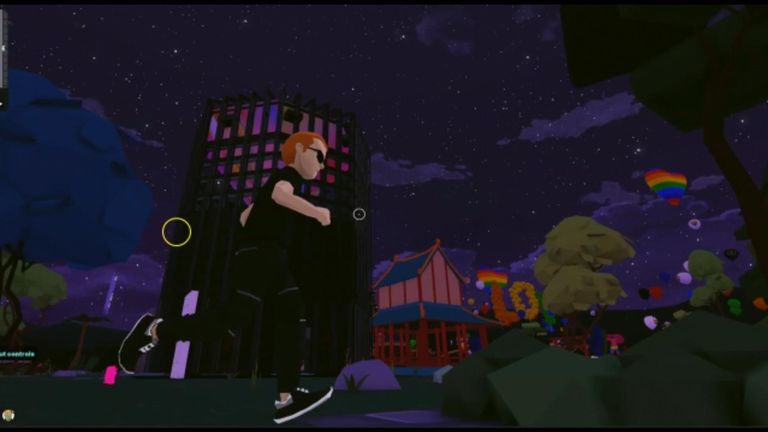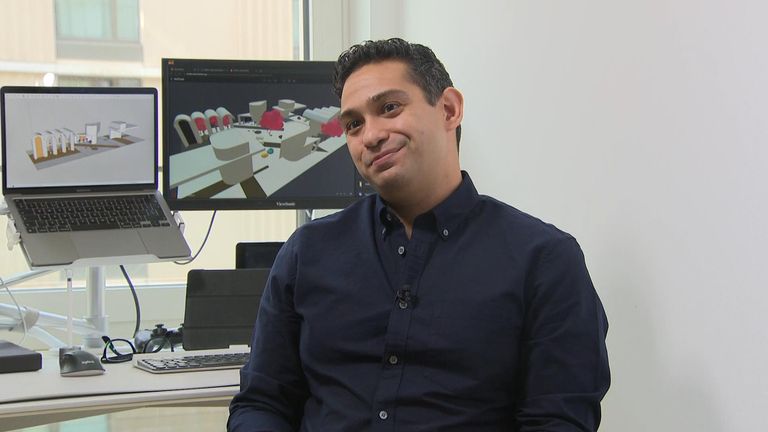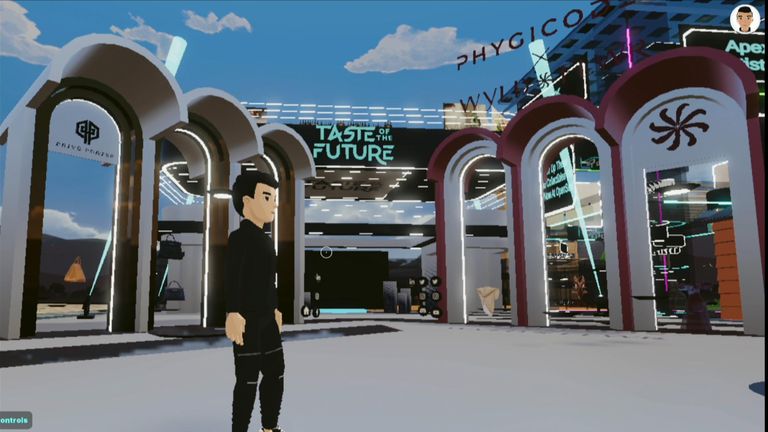Johnny McCamley has spent nearly £5,000 on plots of land.
But he can’t physically walk on this land – and he can’t live there or build a house on it.
That’s because the 23-year-old’s investment is in the metaverse, meaning his land is completely virtual and exists solely within a digital world.
Mr McCamley, from Belfast, is one of many people who have decided to buy virtual property in the metaverse.
Last year, transactions of virtual land reached $350m (£267m) in The Sandbox, the largest platform for digital property, according to a report by the Centre for Finance, Technology and Entrepreneurship.
A further $110m (£84.2m) worth of transactions were made in Decentraland, the second-largest metaverse platform.
What is the metaverse?
The metaverse is not a single digital space. It’s a network of virtual reality worlds, set up by companies and platforms, where users can interact, play games, attend events and buy land.
One better-known metaverse is Horizon Worlds. It has been created by Facebook, which has now changed its name to Meta as the tech giant shifts its focus to virtual spaces.
Other brands have also announced their own digital realms.
Manchester City are planning to build the first metaverse football stadium in partnership with Sony.
Mr McCamley, the chief executive of CryptoClear, bought his plot in The Sandbox last October. He said: “There are casinos in the metaverse, there’s also museums, but there’s also events such as podcasts and also conferences as well that I’ve actually attended. So, the best way to look at it is, it’s taking the real world and really digitising it way beyond the likes of Zoom.”
Why are people buying virtual property?
For Mr McCamley, the chance to stake a claim in this imaginary world was an opportunity not to be missed, despite market uncertainty and price volatility making it a risky investment.
“It’s like any new investment, any new asset class. When I got into Bitcoin when it was $300 I was told it was extremely risky, the same with Ether at $4. I think getting a piece of land in Decentraland for $4,000 is an absolute bargain,” he said.
He intends to hold his purchase for 10 years: “I believe the metaverse will mature in around a decade and I’ll think about selling the land when that time comes.”
Landowners can also use their virtual spaces to design experiences for others to enjoy.
“The community-owned pieces of land, they’re my favourite. A really, really good example is, I believe it’s a ‘gecko beach’ that somebody has done which, as you can guess, is a beach full of geckos,” said Mr McCamley.
House-hunting in the virtual world
Searching for the perfect home in the metaverse is similar to real life.
Land next to roads, and near desirable districts like “fashion” or “museum” areas, will carry a higher price tag and are more attractive investment opportunities.
In The Sandbox, busier central areas near other landmarks are much more expensive than newer neighbourhoods on the outskirts.
Who your neighbours are will also affect the value of your property.
In September 2021, rapper Snoop Dogg announced his own digital “Snoopverse” in The Sandbox.
Two months later, a property next to his plot sold for over $450,000 (£350,000).
But, unlike traditional property purchases, there is no third party or legal presence who can ensure deals are legitimate.
This can be risky when buying from a secondary market such as OpenSea, where purchases are made using cryptocurrency.
Why are people building virtual property?
As well as landowners, there is a new generation of “meta architects” who design virtual spaces.
Stavros Zachariades is a traditional architect working in south London, but began designing for the digital world over the pandemic after his brother Adonis founded Renovi, an NFT marketplace.
The 37-year-old recently designed pop-up shops for metaverse fashion week.
“The draw to the metaverse and building in the metaverse is [people and businesses] can show what they’re about,” Mr Zachariades said.
“They can show their products. We can offer meeting spaces for different people, especially now with COVID and the past two years of people being more remote.
“You can have, from the realms of super sci-fi, floating buildings that rotate and transform – and to the other side of the realm, historic, classical architecture styles.”
He thinks the metaverse could open doors to those who lack connectivity in real life: “I was thinking about how accessibility can change, for example, somebody who doesn’t have the same mobility can just be an equal in the metaverse. Why not?”
‘It’s just impossible to know what the endgame is’
But many are warning these investments could flop.
YouTuber “Mitch Investing”, from Birmingham, regularly delves into subjects like personal finance and emerging technologies on his channel.
He thinks promises of the metaverse becoming part of our everyday life may be overblown.
“It’s so early on in its development it would be like investing into a company that had only been operating for a year. You’re not sure if it’ll take off or not, not too sure where the business is going, not too sure how the business model might develop… it’s highly speculative in my view,” the 26-year-old said.
There is a worry that not all virtual worlds will be successful in attracting a large enough number of users.
“There could be thousands of metaverses like there are websites today. It’s just impossible to know what the endgame is,” he warned.
Risk and volatility
The Financial Conduct Authority labelled cryptoassets as “very high risk, speculative investments” and warned that people who trade in these should be prepared to lose all their money.
There are also wider concerns about safety for users in terms of online harm.
The newly introduced Online Safety Bill will take into account activity in the metaverse, with companies being required to take action if fraud is committed by its users, including those in virtual reality spaces.






